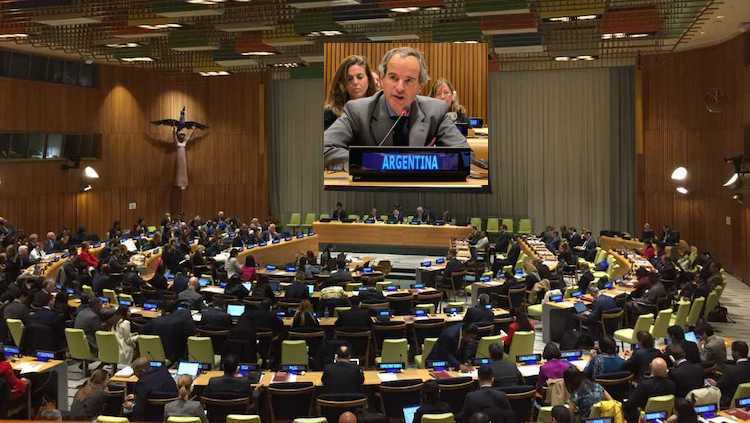The first week of the X NPT Review Conference was held in New York, during which 9 plenary meetings were held, as well as two meetings in the first committee.
As expected, the first week of the conference was held amid accusations of violation of the “spirit of the treaty” by Russia in connection with its special operation in Ukraine. For example, France has made accusations that Moscow uses nuclear weapons not as a deterrent, but as an instrument of intimidation and coercion. The charges also related to the situation around the Zaporozhnaya NPP, as well as the increased level of combat readiness of the Russian strategic nuclear forces.
However, it is worth noting that not all States supported the Western-led “cancel culture”. Thus, Holy See, as well as representatives of the New Agenda Coalition, called on all nuclear states to lower the level of combat readiness of the deterrent forces (we would like to recall that France also announced an increase in the combat readiness of the naval deterrent forces in March 2022). Representatives of Algeria and Kiribati recalled the consequences of nuclear tests conducted by France, the United Kingdom and the United States on the territory of their countries during the Cold War. The Non-Aligned Movement also noted with regret that some countries have increased their nuclear arsenal since the last conference.
As for the nuclear states, if we discard the accusations related to Ukraine, it can be noted that the statements of the “nuclear troika” (the United States, Great Britain, France) focused on what France called the “minimum agenda”: the need for the entry into force of the CTBT (although the United States is still one of the states that does not who have ratified the treaty), the beginning of negotiations on an FMCT, strengthening verification measures and reducing nuclear risks. In addition, the United States expressed readiness to resume a dialogue on strategic stability with Russia. The United Kingdom, whose representative began his statement with an appeal to the Ukrainian representative, tried to justify the buildup of its nuclear arsenal by “the deteriorating international environment.”
Russia and China, in turn, drew attention to the unscrupulous compliance with the NPT by the nuclear troika. Russia called the involvement of Great Britain and France in multilateral disarmament negotiations a “priority”, and also expressed disagreement that verification of disarmament for some powers is becoming a “panacea for all problems”: “We are convinced that verification procedures cannot be considered in isolation from specific arms reduction and limitation agreements and must be consistent with the subject matter and scope of the limitations contained therein,” the Russian representative said, speaking at a meeting of the first committee on August 5.
China, in turn, accused Western countries of promoting “double standards” in the field of nonproliferation, referring to the supply of nuclear submarines to Australia within the framework of AUKUS. China also stated that “any attempt to replicate the NATO’s nuclear sharing model in the Asia-Pacific region would undermine regional strategic stability and would be firmly opposed by the countries in the region and, when necessary, face severe countermeasures .”
All members of the “nuclear five” in their statements confirmed the Gorbachev-Reagan formula that there can be no winners in a nuclear war and it should never be unleashed.
The statements of the coalitions attracted particular attention. The Non-Aligned Movement, ASEAN, and the Nonproliferation and Disarmament Initiative came out with more moderate positions in the field of disarmament, while the African Union openly called on the conference participants to sign and ratify the NWFZ. Traditionally, an important place in the statements of other coalitions was occupied by the issues of the humanitarian consequences of the use of nuclear weapons, verification measures, reduction of nuclear risks, and the creation of a nuclear security zone in the Middle East.
A press conference of the CTBTO Executive Secretary Robert Floyd was also held on Friday, August 5. Floyd stressed that despite the fact that the treaty has not entered into force, it continues to play an important role in the field of non-proliferation and disarmament. “We have gone from more than 2,000 nuclear tests conducted between 1945 and 1996 to less than 12 tests conducted since the signing of the treaty,” said R. Floyd. Within the framework of the organization, a modern nuclear test monitoring system was created, which includes about 300 new installations. In addition, during the existence of the treaty, the CTBTO has created a solid data and research base that is available to all parties to the treaty for civil and scientific purposes, and has also developed a tsunami warning system.
In general, despite the tense international situation, almost all participants expressed their willingness to cooperate and hope for a successful conclusion of the conference.
In general, despite the tense international situation, all participants expressed their willingness to cooperate and hope for a success of the conference. The meetings of the Second and Third Committees are to begin today. PIR Center will continue to monitor the progress of the conference and publish reviews of plenary meetings and side-events.


